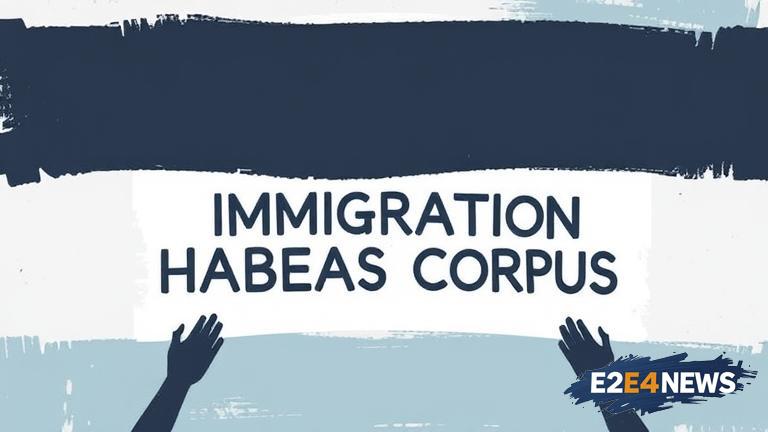The concept of habeas corpus, a fundamental right enshrined in the US Constitution, has been a cornerstone of American jurisprudence, ensuring that individuals are not unlawfully detained. In the context of immigration, habeas corpus petitions have become an essential tool for challenging the detention and deportation of non-citizens. Recently, there has been a surge in the number of immigration-related habeas corpus petitions filed in federal courts, highlighting the growing concerns surrounding the treatment of immigrants in the US. The Immigration and Nationality Act (INA) provides the legal framework for the detention and removal of non-citizens, but its provisions have been subject to interpretation and challenge in the courts. The Supreme Court has played a significant role in shaping the landscape of immigration habeas corpus, with landmark decisions such as Zadvydas v. Davis and Boumediene v. Bush. These decisions have established the principle that non-citizens have the right to challenge their detention and deportation through habeas corpus petitions. However, the process of filing and litigating these petitions can be complex and time-consuming, often requiring the assistance of experienced attorneys. Despite these challenges, many immigrants have successfully used habeas corpus petitions to secure their release from detention and avoid deportation. The use of habeas corpus in immigration cases has also raised important questions about the balance between national security and individual rights. As the US government continues to grapple with the complexities of immigration policy, the role of habeas corpus in protecting the rights of non-citizens is likely to remain a contentious issue. In recent years, there has been a growing trend towards the use of habeas corpus petitions to challenge the detention of immigrants in private prisons and other facilities. This has led to increased scrutiny of the conditions and treatment of immigrants in these facilities, with many reports highlighting allegations of abuse and neglect. The Department of Homeland Security (DHS) has faced criticism for its handling of immigration detention, with many arguing that the agency has failed to provide adequate safeguards for the rights of non-citizens. In response to these concerns, some lawmakers have proposed reforms to the immigration detention system, including the use of alternative forms of detention and increased oversight of facilities. The American Civil Liberties Union (ACLU) and other advocacy groups have been at the forefront of efforts to challenge the detention and deportation of immigrants, using habeas corpus petitions as a key tool in their litigation strategy. As the debate over immigration policy continues to unfold, the importance of habeas corpus in protecting the rights of non-citizens is likely to remain a central issue. The US Court of Appeals for the Ninth Circuit has been a key venue for immigration-related habeas corpus petitions, with many significant decisions emerging from this court. The use of habeas corpus in immigration cases has also raised important questions about the role of federal courts in reviewing the decisions of immigration authorities. In addition to its use in challenging detention and deportation, habeas corpus has also been used to challenge the conditions of confinement for immigrants, including access to medical care and other basic necessities. The interplay between habeas corpus and other forms of relief, such as asylum and withholding of removal, is complex and multifaceted. As the US legal landscape continues to evolve, the role of habeas corpus in immigration cases is likely to remain a vital and contested issue. The country of origin for many immigrants seeking to challenge their detention and deportation through habeas corpus petitions is often a key factor in their cases, with different countries having different levels of protection and support for their citizens. The use of habeas corpus in immigration cases has significant implications for the US government’s ability to enforce its immigration laws, with many arguing that the petitions undermine the authority of immigration authorities. Despite these challenges, the importance of habeas corpus in protecting the rights of non-citizens cannot be overstated, and its use is likely to continue to play a critical role in shaping the US immigration landscape.





